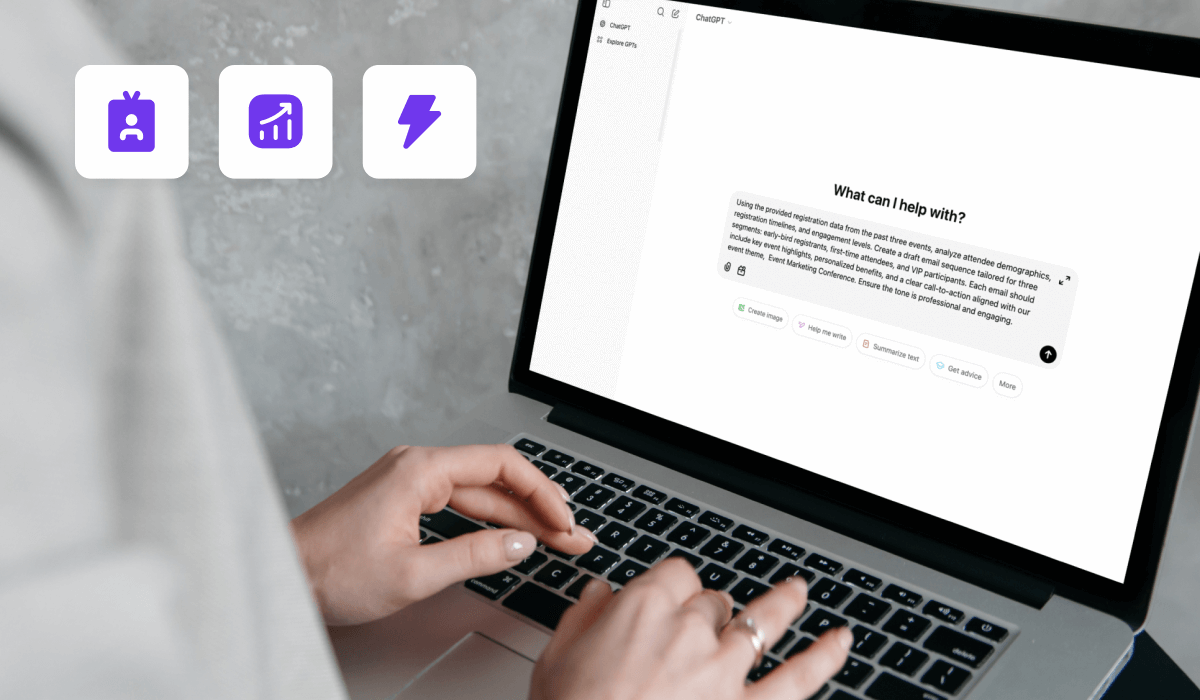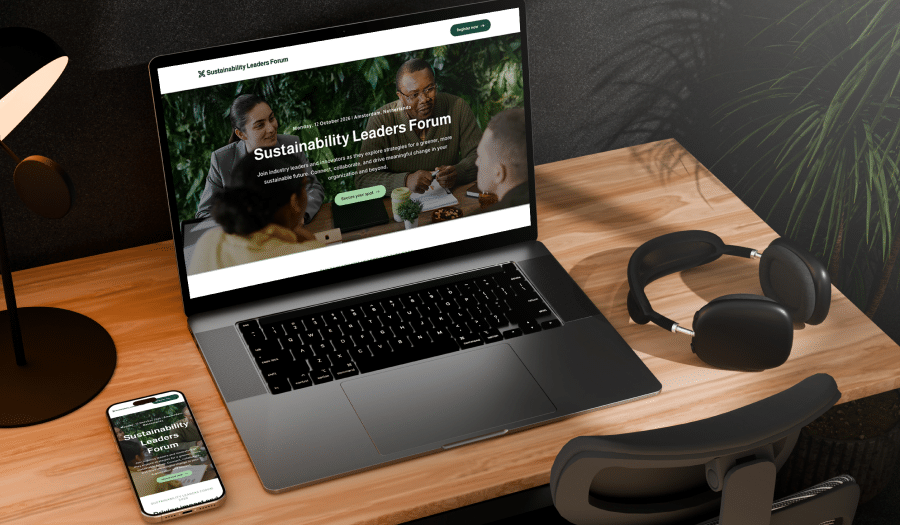
Artificial intelligence (AI) is making it easier to plan, promote, and personalize events. Event managers are using AI tools to speed up and automate a variety of tasks, from marketing to attendee engagement.
If you’re wondering how you can use AI to plan bigger and better events, keep reading our guide to AI in event management. We’ll explore seven different applications of AI for event managers:
- Automating event marketing
- Increasing event registrations
- Increasing audience engagement
- Facilitating networking
- Improving event accessibility
- Creating cost-savings
- Analyzing event feedback and success
Throughout the article, we’ve also included detailed AI prompts to help you make the most of your AI assistant and optimize your event planning efforts.
Automating event marketing
Planning an event is a lot of work and at times it can feel like you don’t have enough time to give it the promotion it deserves. AI can be used to automate some of the manual and time-consuming components of event marketing. It can also boost your creativity and increase your content output.
Personalized marketing campaigns
Savvy event marketers are using AI to segment audiences and deliver targeted campaigns based on their attendees’ demographics, interests, and past behaviors. Using tools like ChatGPT and Jasper AI, they can create highly relevant and personalized content, from email sequences to social media content, at scale. This tailored approach can ultimately lead to higher engagement and event registrations.
Example prompt:
Using the provided registration data from the past three events, analyze attendee demographics, registration timelines, and engagement levels. Create a draft email sequence tailored for three segments: early-bird registrants, first-time attendees, and VIP participants. Each email should include key event highlights, personalized benefits, and a clear call-to-action aligned with our event theme, [Event Name]. Ensure the tone is professional and engaging.
Content creation
If you have a great lineup of speakers, you should repurpose their keynote presentations to market future events. Event marketers can use AI tools to quickly generate transcripts from presentations, and then use generative AI to create a series of wrap-up articles, press releases, email campaigns, and social media updates.
You can also use generative AI to brainstorm new ideas for events. Ask it to analyze your past marketing campaigns and create new content ideas for your next event.
AI is great at analyzing large amounts of information quickly, so it’s useful to use it in the research and ideation phase of content creation. Make sure that you proofread and personalize any event content you create to make sure it looks and feels like your brand.
Increasing event registrations
Since AI is great at analyzing data, recognizing patterns, and making recommendations, it can be used to optimize the event registration process, simplify ticketing, recommend add-ons, and maximize registrations.
Smart ticketing and registration
Your sponsors will expect you to get as many attendees as possible and AI can be used to further optimize your registration flows to make tailored ticket-type recommendations. This is a great way to increase registration conversions and ensure you’re providing the most efficient experience to maximize your event ROI.
Example prompt:
Analyze the attached registration flow for [Event Name], including page layouts, question phrasing, and logic paths. Identify bottlenecks or steps that may deter users. Suggest specific areas where questions can be removed, combined, or rephrased to improve clarity and reduce friction. Provide recommendations for logic-based personalization (e.g., showing different questions for corporate attendees vs. students) and faster completion rates.
Automated scheduling and agenda creation
For multi-session events, AI can enhance your schedules by suggesting speakers, optimizing time slots, and preventing overlaps. Creating an organized agenda with exciting speakers means you are more likely to win potential attendees over and boost your event registration rates.
Example prompt:
Create a comprehensive event agenda for [Event Name], a one-day hybrid conference featuring [#] speakers and [#] sessions. Use the provided speaker list and session details, ensuring no topic overlaps and logical time allocation. Include 10-minute transition times between sessions, a networking break, and a keynote slot with a 30-minute Q&A. Align the agenda with our theme, [Theme Name], and ensure a balance of variety and flow.
Increasing audience engagement
Engaging attendees before, during, and after your event is essential. AI boosts audience engagement by helping you deliver meaningful personalization and activate real-time insights.
Speaker and topic recommendations
AI can analyze industry trends, social media activity, and past event data to recommend trending topics and influential speakers. These insights can help you curate a highly engaging event, with event themes and sessions that will appeal to your audience’s interests.
Personalized event recommendations
Since AI can analyze large data sets, you can use it to analyze attendee profiles. From there, it can suggest relevant sessions, workshops, or networking opportunities. The result? A tailored and exciting event experience for every single individual. This level of personalization throughout your event communications can help attendees feel valued and encourage them to register again next time.
AI-powered transcription and translation services
AI-powered tools like Otter.ai enable real-time transcription of speeches and panel discussions. This makes it easy for you to offer closed captions that help all attendees follow discussions. You can also provide live translation in multiple languages, making events more accessible to non-native speakers and ensuring an engaging experience for everyone
In-depth engagement analysis
Why not track and optimize engagement throughout your event? AI can analyze event engagement with data from your live polls, Q&As, gamification, and more. Measuring engagement rates and sentiment allows you to discover which sessions are resonating with your audience and make adjustments – even in real-time, if you need.
Example prompt:
Using the engagement data from [Event Name] (Attached: Poll Results, Session Attendance, and Session Survey Results), identify trends in audience interaction. Highlight the top-performing sessions and engagement activities, as well as areas with low participation. Provide actionable recommendations for enhancing engagement, such as content improvements or new interactive features.
Facilitating networking
Many events are designed to help facilitate networking. It is a core component of events and AI is unlocking new ways to make these connections smarter, more personalized, and impactful.
Networking matchmaking
The opportunity for AI-powered networking is one of the most exciting developments in the event industry. As technology evolves, so do the possibilities to create dynamic, personalized networking experiences that transform how attendees engage with one another.
Just imagine an event where every attendee receives personalized suggestions for who they should connect with, based on shared interests, industries, or goals. AI definitely has the potential to really elevate the networking experience.
Automated pre-event and follow-up communication
AI tools can segment attendees based on their interactions with others and engagement with activities. You can then generate personalized emails to analyze themes, share resources, provide recommendations for future events, and recommend networking communities that they can sign up to. Targeted communications foster stronger relationships with and among your attendees.
Example prompt:
Analyze the attendee meeting data (Attendee Meeting Summary List and Attendee Meeting Schedule) to group communications by key themes. Deliver insights and draft email templates for the following:
- Thematic summaries: Identify common themes or interests across attendees’ scheduled meetings and preferences. Group attendees by these themes and create targeted pre-event communication templates highlighting relevant sessions, key contacts, and preparation tips.
- Post-event engagement: Generate follow-up messages grouped by meeting themes, summarizing key takeaways or trends observed during the event and suggesting relevant resources or future opportunities for networking.
Ensure each email is concise, professionally written, and aligned with [Event Name]’s branding. Include suggestions for optimal timing and delivery of these communications to maximize attendee engagement.
Improving event inclusivity
AI-driven technology can break down participation barriers and promote inclusivity, making events more accessible to diverse audiences.
Real-time translation, transcription, and subtitling
AI can provide live translations and captions during sessions, helping non-native speakers and people with hearing challenges fully participate in the event. AI transcription services also help you create text from live speeches or panel discussions and can be used to create helpful resources that can be shared after the event. These tools expand the reach of your event and foster inclusivity.
Personalized event recommendations for accessibility
If you gather information about attendee needs during the registration process, you can use AI to help recommend accessible sessions and assistive technology. You could also provide helpful information about your venue via your attendee app or event communications so that every guest can plan ahead and feel accommodated.
Creating cost-savings
AI-powered automation can help reduce the cost of delivering your event by reducing the need for manual work and helping you allocate your resources more effectively.
Expense optimization
Let AI analyze your historical spending and budget data to identify opportunities for cost savings. AI can help you make better financial decisions and spend your budget efficiently when reviewing past expenditures and patterns.
Automated customer support with chatbots
You can set up chatbots on your event website via plugins to provide 24/7 assistance to attendees (ChatBot and Botsonic are great options). And, by programming them to answer frequently asked questions, you can offer information to your guests in real-time. This automation also reduces the need for a large customer service team, freeing up your resources for other important tasks.
Example prompt:
Analyze the content from [Event Website URL] and create a chatbot flow that aligns with the event details. The flow should include:
- Event information: A greeting message offering quick access to FAQs about the event’s schedule, location, and speakers.
- Registration assistance: A step-by-step guide for users needing help with the registration process, including troubleshooting tips for common issues.
- Session recommendations: A logic-based pathway that helps attendees identify sessions relevant to their interests by asking a few simple questions.
- Contact support: An option to escalate complex questions to a live representative or email support team.
Design the chatbot flow to be friendly, concise, and aligned with the branding and tone of [Event Name].
Analyze event feedback and success
Event technology can help you capture feedback before, during, and after your event and AI can help you use it to make better decisions.
Data-driven insights post-event
AI tools can analyze post-event surveys, attendance, and engagement data to determine what elements of your event resonated with audiences. Using pattern recognition, AI can pick out common themes, understand sentiment from different audience segments, and find gaps in your planning. This can help you understand your audience better and provide actionable insights that can be used to improve your events in future.
Automated reporting and metrics
AI tools and event management integrations can pool your data together from disparate systems. You can streamline the reporting process to your sponsors by stitching together results, metrics, and KPIs – this will save your team time, and ensure that decision-makers understand the value your event has delivered.
Example prompt:
Analyze the post-event feedback from [Event Name] (Attached: Survey Responses). Identify the top three aspects attendees appreciated the most and the two most commonly cited areas for improvement. Include direct attendee quotes where relevant and provide actionable recommendations to enhance the experience for future events.
Looking to adopt AI for events?
From marketing automation to real-time engagement insights, AI has a growing number of applications in event management. Incorporating AI-powered tools can create more engaging, inclusive, and valuable events that meet the needs of your diverse attendees. As AI continues to evolve, so will its role in event management, leading to continuous innovation opportunities.
EventsAir is an event management platform that gives you one place to gather event data and then leverage it with AI. Most recently, EventsAir introduced an AI-powered update to enhance our support experience for customers. This new feature leverages AI to provide faster, more personalized assistance, ensuring our customers have the resources and guidance they need to make their events a success.
Ready to explore the possibilities? Request a demo or find a plan that suits your needs.
Event Planning & Management | Event Technology & Apps
See EventsAir in action
Discover why 12,000+ event professionals trust EventsAir to deliver effortless events, every time.




